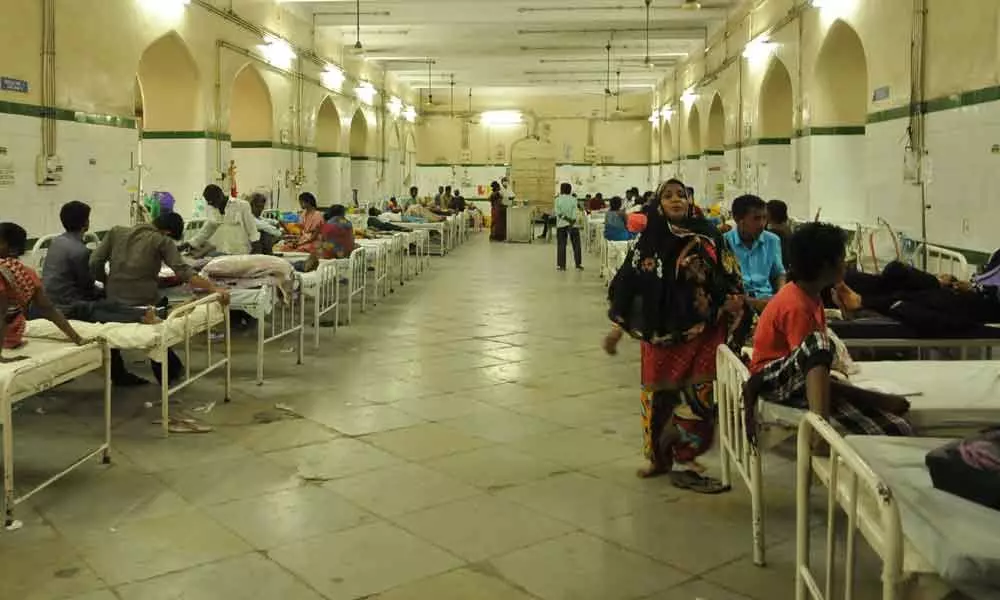Telangana State Govt nurses heading for burnout

The state is reeling under the deluge of dengue and other seasonal ailments. Apart from people who have been hit hard, the nursing community, too, has been hit, albeit not by dengue but having to overwork for long, wearing hours to take care of the patients.
Hyderabad: The state is reeling under the deluge of dengue and other seasonal ailments. Apart from people who have been hit hard, the nursing community, too, has been hit, albeit not by dengue but having to overwork for long, wearing hours to take care of the patients.
Srividya (name changed), a nurse of Gandhi Hospital, said, "For the last few months we have been working an additional four hours." Patients from across the state have been visiting government hospitals such as Osmania Hospital, Gandhi Hospital, Niloufer Hospital, Fever Hospital and even Maternity Hospital at Petlaburj.
The infrastructure and medical staff at public facilities are proving inadequate to deal with the huge rush of patients. At some hospitals, two patients are being accommodated on one bed. Some patients are seen being treated on the floor. Sunita R, Head nurse, Osmania General Hospital, said, "Since July we have been working for double or triple shifts. For a single shift only 2 nurses are allotted which has become hectic for us due to the increase of fever cases.
There are 4 medical wards in this hospital, three for men and 1 for women. Each ward has 15-20 beds. Due to the rise of fever cases, both men and women have mixed up in the medical wards. Adding to this, more than two patients need to adjust in a single bed. The proportion of cases with nurses is incomparable. More than 100 patients come to the hospital per day ," added Sunita.
Head Nurse Sujatha at Niloufer Hospital shared similar plight. "Nurses here have been working in triple shifts for the past two months. Currently, the nurse-to-patient ratio is very high in Niloufer. Generally, the ideal ratio should be 1:5, but at Niloufer the ratio is 1:10. On some days, it goes up to 1:15, due to which nurses are having to work extra shifts.
Each ward has two nurses and sometimes only one to look after the whole ward which is hectic for them as there are a lot of patients." She further added, "There are 45 beds in one ward which has 150 patients in them which clearly shows the extensive load on the nurses. We are trying to manage patients in wards by making two patients and even three patients lie down on one bed as we can't ask them to go back."
Akram, attendant of a patient Asiya who came from Shamirpet, lamented, "We can't afford to rent a room in the city; so, we packed all our stuff and have practically moved in here. I sleep in the corridor while my wife sleeps with my daughter in the ward." "What to do, we have come from Suryapet. There's no other way, so, we have decided to take the floor as we cannot afford the cost of private hospital.
The day before yesterday I bought my wife here, as there are no beds available I decided to make her sleep in the floor and only yesterday doctor and nurse attended to her and today no one has come yet," deplored Suresh Babu. Generally, for five patients, there should be a nurse but at Gandhi Hospital the ratio is only one nurse for every 20 patients.
Mangamma, the Head Nurse at Gandhi Hospital, said "Our nurses are struggling to handle the patients. There are 200 nurses in the hospital to handle the patients in various wards and as in these few days, the hospital is filled with dengue patients so for that reason, nurses are doing extra hours. Generally, the timing for nurses is 8 am to 2 pm, 2 pm -8 pm, and 8 pm to 8 am."
Sujatha, a nurse, said her my timings were 8 am to 2 pm, "but I am working till 8 pm to handle the patients. I am running form one bed to another bed for collecting blood samples or for checking their condition or giving medicines."
By Avinash Bhingarde, Meghna Nath & Tejal Sinha








